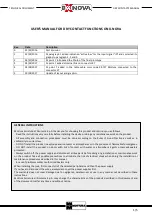
3/5
DRY CONTACTS MANUAL
TECHNICAL DOCUMENT
3) HOW TO GET THE STATUS OF THE LOCK AND OPEN IT
Before performing a maneuver we suggest to know the state of the lock, then make an opening. The lock remains
awake (providing its status) for all the time necessary to complete the maneuvers.
In the following example we show this general sequence:
a) Wake up the lock with short time pulse at input IN (see the time 0.5 sec. in the charts).
b) read the status of the lock.
c) if necessary, open the lock with pulse at input IN (see the time 1 sec. in the charts)
d) wait for the lock to perform the work ( max 15 sec.).
e) finished the movement of the latches, lock still showing their status for 3 sec. (TIMEOUT period) then goes into
sleep.
Pulse to activate the lock on input signal IN
0
1
0
0,5
1
1,5
2
2,5
3
3,5
4
4,5
5
5,5
6
6,5
7
7,5
8
8,5
9
9,5
10
sec
Level
Signal IN (continuous line = 500 ms ; dashed line = 1500 ms)
0
1
0
0,5
1
1,5
2
2,5
3
3,5
4
4,5
5
5,5
6
6,5
7
7,5
8
8,5
9
9,5
10
sec
Level
All outputs represent their states during the maneuver
0
1
0
0,5
1
1,5
2
2,5
3
3,5
4
4,5
5
5,5
6
6,5
7
7,5
8
8,5
9
9,5
10
sec
Level
All these signals are in D.C. and referred to ground .
4) ERROR SIGNAL
When this signal is active there may be one of the following errors:
- stall of the latches
- Latch bolt not completely escaped
- Request the opening operation with the lock and door already open
- Accidental opening of the door during the closing operation,
- Detected the missing of mechanical cylinder (if equipped with a special sensor).
- latches or latch bolt in the wrong position
When the lock goes into sleep, error signal is reset.
Time of execution of the maneuver





